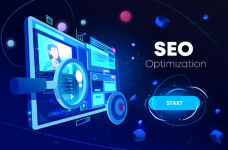Difference between On-Page and Off-Page SEO
When it comes to optimizing a website, there are two crucial factors to consider: on-page SEO and off-page SEO. While a well-optimized site can generate targeted traffic and engagement, it requires a significant amount of effort to achieve higher search engine rankings.
So, what exactly is the difference between on-page and off-page SEO? Well, on-page SEO refers to the optimization techniques applied to the content and structure of your website, while off-page SEO involves the strategies used outside of your website, such as link building and social media marketing.
To better understand these differences, let's take a closer look at the nuances between on-page and off-page SEO.
Why is SEO important?
In the early days of the Internet, people would surf the Web and discover new sites without much guidance or organization. Manual lists, like Yahoo, were the only way to index sites and pages. But with the introduction of Google, the Web started to take shape.
However, early search engines, including Google, only used keywords to understand a page's content. This led to unethical practices like keyword stuffing and hidden text, creating a terrible Internet experience.
Luckily, advocates for ethical strategies and best practices helped shape the Web. Search engines became more sophisticated and started using hundreds of elements to contextualize a page, providing users with valuable, relevant information.
Today, Search Engine Optimization (SEO) has adapted to the evolution of search engines, making it crucial for businesses to optimize their websites to rank higher and provide valuable content to users.
What is On-Page SEO?
When it comes to a webpage, the experience for humans and search engines is entirely different. Humans see visual elements, sounds, and engaging content, while search engines see code and text as data to process. This is where On-page SEO comes in, which has two main objectives: to improve the webpage for a specific topic and offer more value to users, and to optimize a page so search engines can understand what it's about and rank it for desirable terms.
Every webpage has content, which is crucial for users and search engines. Great content naturally includes many on-page SEO elements like relevant keywords and phrases. However, there are additional ways to boost a page's SEO value using on-page SEO tactics.
With On-page SEO, desirable keywords can be added to various elements on a webpage, such as:
- Titles
- Meta descriptions
- Headings
- Body content
- Internal and external links
- Media description
- Structured data.
Essentially, the goal is to create an optimized content piece around a topic with the relevant keywords. This will improve the user experience and give the page stronger SEO value.
What is Off-Page SEO?
Off-page SEO is all about the perceived value of a webpage based on the wider community, while on-page SEO measures what the content is about. When people enjoy great content or products/services, they tend to mention them more, which is a strong indicator of their value. By combining off-page SEO with on-page SEO, a page can earn higher rankings.
Off-page SEO tactics include gaining quality backlinks from relevant sites, social media mentions and links, and building authority through trustworthiness, relevance, and engagement. The most popular way to gain quality backlinks is through site outreach, which involves publishing content on relevant sites with a link back to your website. Another approach is to ask other site owners to link to a resource you've created.
There are also services available to help achieve backlinks, such as blog commenting, Web 2.0 properties, directory submissions, and more. These can be explored in a link building marketplace.
Off-Page vs On-Page SEO, which one is more importantly?
Your website is like a central hub that all of your online efforts radiate from. It's essential to optimize your website before focusing on off-page SEO, as sending traffic to an unoptimized site could lead to a poor user experience. Thus, prioritizing on-page SEO efforts first is important.
To get the best results, focus on high-impact efforts such as researching keywords and competitors, optimizing title, meta, h1, and body content, improving page load speed, and ensuring mobile-friendliness. Great content should also be a primary focus of your on-page SEO strategy.
Once you're satisfied with your on-page elements, you can move on to off-page SEO efforts. Building strong industry connections and asking for mentions and backlinks, publishing great content on relevant sites in your niche to build authority and links, and exploring link building and guest posting services can supplement your off-page SEO strategy.
It's important to remember that SEO is an ongoing investment, and it may take several months to see improved rankings. Therefore, it's ideal to work on a little bit every day to ensure continual growth for your site.
Understanding On-Page and Off-Page SEO: Prioritizing Optimization Strategies
In summary, SEO is crucial for the success of any website. On-page SEO is about optimizing the content and structure of your website, while off-page SEO is about building your website's perceived value through links, mentions, and authority. When it comes to prioritizing between on-page and off-page SEO, it's important to focus on optimizing your website first, as it serves as the foundation for all other online efforts. By consistently investing in both on-page and off-page SEO, you can achieve higher rankings, build your brand and authority, and ultimately drive more traffic to your website.
As always, we invite you to browse our Webmaster Discussions to gain more knowledge on SEO, forum and site management, community building, website revenue and monetization, and other great discussions available.
If you find this article interesting, feel free to share!

